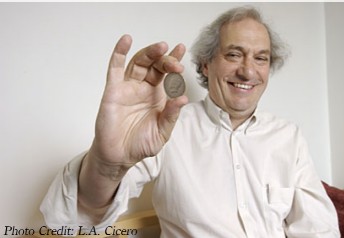Persi Diaconis
Mary V. Sunseri
Professor of Statistics and Mathematics, Stanford
University
September 27, 2007 -- 4:00 p.m.
Mathematics and Magic Tricks
The way that a magic trick works can be even more
amazing than the trick itself. I will illustrate by
performing and explaining a trick whose mathematical
underpinnings involve secret codes, robot vision,
breaking and entering and the statistical design of
taste testing experiments. The mathematical questions
raised by the trick lead to the edge of what we know.
This is a talk suitable for a general university audience.
September 28, 2007 -- 4:00 p.m.
Gibbs sampling, orthogonal polynomials
and Alternating projections
The Gibbs sampler (also known as the heat bath algorithm
or Glauber dynamics) is a mainstay of scientific computing.
I will explain the algorithm, give many examples where
the operators can be explicitly diagonalized ( thus
sharp rates of convergence are available) and explain
a useful connection with von Neumann's alternating projection
theorem. This meeting of operator theory and statistics
has consequences for both subjects. All is joint work
with Kshitij Khare and Laurent Saloff-Coste.
|

Persi W. Diaconis (born January 31, 1945) is an
American statistician/mathematician and former professional
magician. He is Mary V. Sunseri Professor of Statistics
and Professor of Mathematics at Stanford University.
He is particularly known for tackling mathematical problems
involving randomness and randomization, but his expertise
is much broader - taking in such topics as group theory,
Fourier analysis, combinatorics, random matrices and
zeros of the zeta function,...
Professor Diaconis achieved national fame when he
received a MacArthur Fellowship in 1979, and again
in 1992 after the publication (with D. Bayer) of a
paper entitled "Trailing the Dovetail Shuffle
to its Lair" (a term coined by magician Charles
Jordan in the early 1900's) which established rigorous
results on how many times a deck of playing cards
must be shuffled before it can be considered "random
enough." They established that the deck gradually
increases in randomness until seven
shuffles, after which the thus-far experienced increase
in randomness with each shuffle decreases sharply.
Seven shuffles, for reasons made precise in the paper,
is what casinos should use.
Among his many honours, in addition to the MacArthur
Fellowship, are a fellowshipo in the American Academy
of Arts and Sciences (1989), membership in the National
Academy of Sciences (1995), and honorary degrees from
the University of Chicago (2003), Universite Paul
Sabatier (Toulouse) (2003), Uppsala University (2005),
and Queen Mary University of London (2006).
|